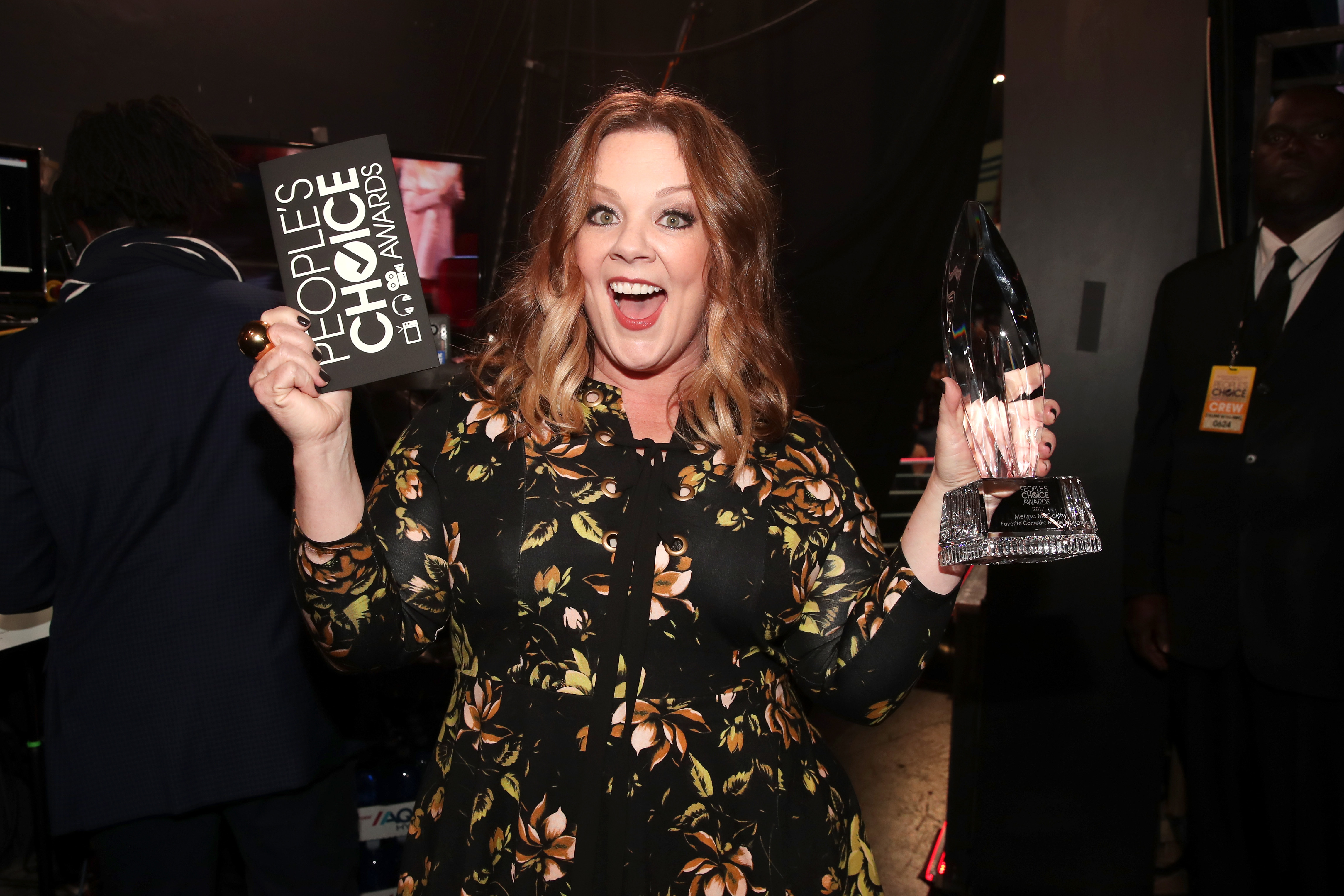How Melissa McCarthy became one of Hollywood's biggest stars
It's time to give the comedian the credit she deserves


A free daily email with the biggest news stories of the day – and the best features from TheWeek.com
You are now subscribed
Your newsletter sign-up was successful
Where have all the movies stars gone? As has happened regularly for the past decade or so, a film-industry publication is alarmed over a perceived lack of A-listers. This time it's The Hollywood Reporter, asking: "If Jennifer Lawrence can't open a movie, who can?"
The answer is Melissa McCarthy.
It's not just that the comedian is a better actor than she gets credit for, playing dumb in Identity Thief, smart in Spy, earnest in Ghostbusters, and raucously offensive in The Boss. For star-assessing purposes, nothing matters as much as consistent ticket sales, and almost no one puts butts in the seats as reliably as she does.
The Week
Escape your echo chamber. Get the facts behind the news, plus analysis from multiple perspectives.

Sign up for The Week's Free Newsletters
From our morning news briefing to a weekly Good News Newsletter, get the best of The Week delivered directly to your inbox.
From our morning news briefing to a weekly Good News Newsletter, get the best of The Week delivered directly to your inbox.
This might come as a surprise to The Hollywood Reporter. In assessing the dwindling power of today's movie stars, it makes a common point: Intellectual property has taken over Hollywood, making audiences more interested in following franchises like Batman and Spider-Man and less interested in following actors. That's true to an extent, but what this complaint misses is that not every hit movie needs to make superhero-style money and very few movie stars, even big ones, have spotless track records.
McCarthy comes close though. Since breaking out from character-actor obscurity as part of the Bridesmaids ensemble in 2011, she has yet to appear in a movie that wasn't at least a moderate hit. Identity Thief, The Heat, and Spy were all very successful. Two smaller-scale comedies she made with her husband Ben Falcone, Tammy and The Boss, did far better than their mixed-to-negative reviews indicated they would, and St. Vincent (in which she had a strong supporting role) was an indie hit. The closest she's come to a financial miss was the 2016 Ghostbusters remake, which made money similar to her other hits, but cost a lot more to create, making it more of a studio accounting error than a movie audiences really rejected.
It makes a weird kind of sense that putting McCarthy in a brand-name remake would not be one of her biggest successes. As with most big stars, she is the brand; adding another brand feels redundant. A smaller movie like The Boss may not have made $300 million domestically, but presumably almost everyone who saw it did so because they wanted to see Melissa McCarthy in a movie. That is the precise definition of movie star.
Yet in the likely event that McCarthy's next movie (May's Life of the Party, another collaboration with Falcone) keeps the streak alive, she still may not get the credit she deserves. Consistently starring in money-making comedies doesn't seem to count as "real" star power, because it doesn't involve steering massive-budget vehicles across a variety of genres.
A free daily email with the biggest news stories of the day – and the best features from TheWeek.com
In reality, very few stars have actually accomplished this feat. As major a figure as Tom Cruise couldn't turn Eyes Wide Shut or Magnolia into smashes during his prime; he could only attract a larger audience than likely would have been interested without him. McCarthy seems to have the opposite quasi-limitation: She couldn't boost a Ghostbusters remake into phenomenon status because she hasn't built her audience on lavish budgets or spectacle. She can, however, bring crowds to movies of relatively little spectacle beyond her peerless facility with improvised insults, which may well serve as a relief when pitted against the all-season would-be blockbusters.
There have always been comic actors with box office pull, of course, but many of them expand their appeal by going effects-heavy and/or family-friendly; think of Ben Stiller in Night at the Museum or Will Ferrell in Elf. But McCarthy's non-Ghostbusters movies have flourished despite relatively modest productions, and often with an R rating. Indeed, part of her appeal seems rooted in her ability to keep her movies grounded, even if she's doing or saying something outlandish. The Heat may be a buddy action-comedy, but it emphasizes the "buddy" and "comedy" aspects a lot more than the action. Even the more elaborate caper Spy has a relatable hook involving her character feeling underappreciated at work.
In a world of movie superheroes, making hit comedies might seem like a niche skill. But McCarthy's record places her alongside Leonardo DiCaprio and Dwayne Johnson, without as much support from A-list auteurs or brand-name ensembles. The ascendance of a new star may not be as lavish as it used to be, but ignoring McCarthy's consistency contributes to the mentality that only the biggest, noisiest movies matter. Stars are supposed to be their own brand names, their own special effects, and not particularly reliant on sequels. That's McCarthy all over.
Inevitably, something will break her hot streak. She might have to resign herself to a career akin to Will Ferrell's, remaining a draw while weathering a mix of hits and flops. Then again, maybe she'll just keep going and remain a clockwork performer, like Denzel Washington, attracting a crowd nine times out of 10 for nearly 20 years.
Movie stars are often known for making their skillsets look deceptively easy. Maybe McCarthy is too good at her job to get the recognition she deserves.
Jesse Hassenger's film and culture criticism has appeared in The Onion's A.V. Club, Brooklyn Magazine, and Men's Journal online, among others. He lives in Brooklyn, where he also writes fiction, edits textbooks, and helps run SportsAlcohol.com, a pop culture blog and podcast.
-
 How to Get to Heaven from Belfast: a ‘highly entertaining ride’
How to Get to Heaven from Belfast: a ‘highly entertaining ride’The Week Recommends Mystery-comedy from the creator of Derry Girls should be ‘your new binge-watch’
-
 The 8 best TV shows of the 1960s
The 8 best TV shows of the 1960sThe standout shows of this decade take viewers from outer space to the Wild West
-
 Microdramas are booming
Microdramas are boomingUnder the radar Scroll to watch a whole movie
-
 Walter Isaacson's 'Elon Musk' can 'scarcely contain its subject'
Walter Isaacson's 'Elon Musk' can 'scarcely contain its subject'The latest biography on the elusive tech mogul is causing a stir among critics
-
 Welcome to the new TheWeek.com!
Welcome to the new TheWeek.com!The Explainer Please allow us to reintroduce ourselves
-
 The Oscars finale was a heartless disaster
The Oscars finale was a heartless disasterThe Explainer A calculated attempt at emotional manipulation goes very wrong
-
 Most awkward awards show ever?
Most awkward awards show ever?The Explainer The best, worst, and most shocking moments from a chaotic Golden Globes
-
 The possible silver lining to the Warner Bros. deal
The possible silver lining to the Warner Bros. dealThe Explainer Could what's terrible for theaters be good for creators?
-
 Jeffrey Wright is the new 'narrator voice'
Jeffrey Wright is the new 'narrator voice'The Explainer Move over, Sam Elliott and Morgan Freeman
-
 This week's literary events are the biggest award shows of 2020
This week's literary events are the biggest award shows of 2020feature So long, Oscar. Hello, Booker.
-
 What She Dies Tomorrow can teach us about our unshakable obsession with mortality
What She Dies Tomorrow can teach us about our unshakable obsession with mortalityThe Explainer This film isn't about the pandemic. But it can help viewers confront their fears about death.
